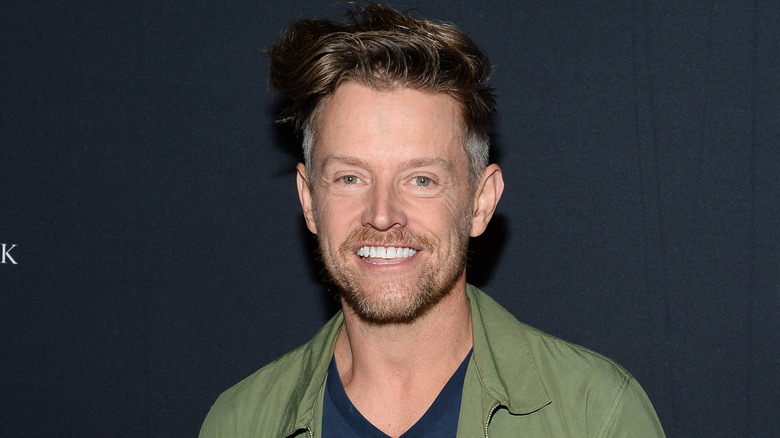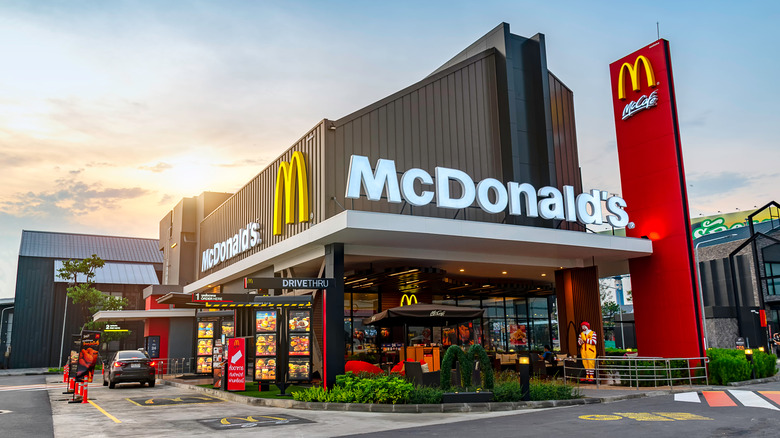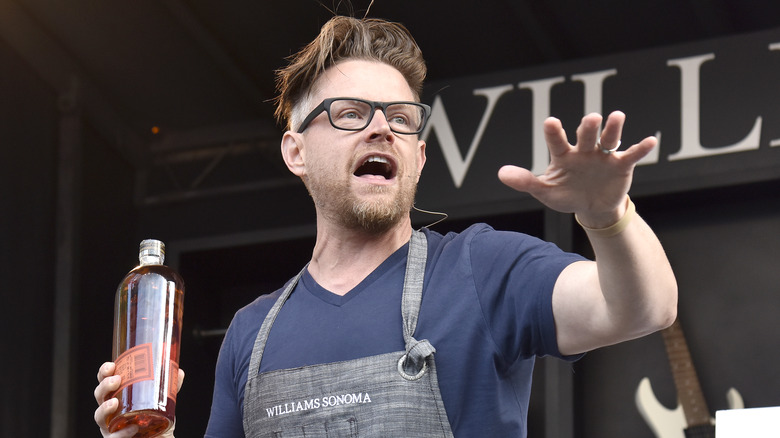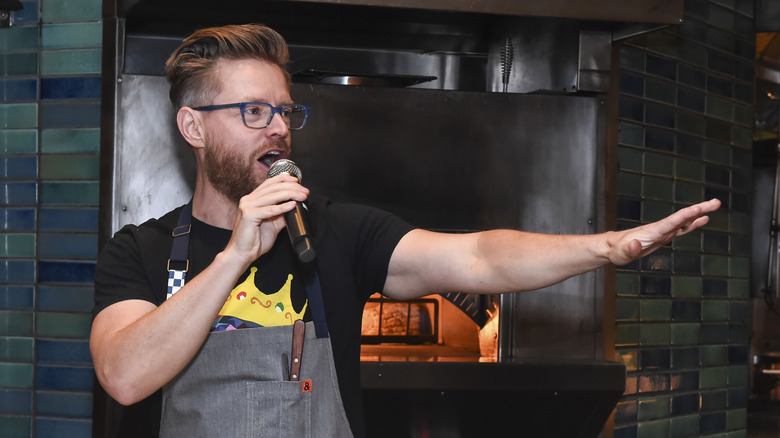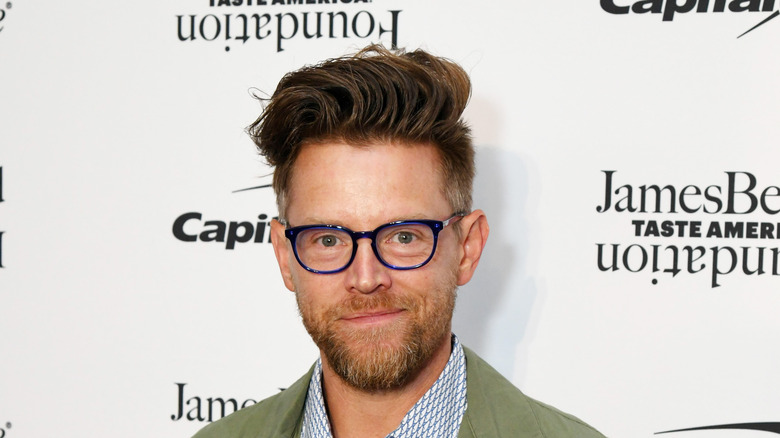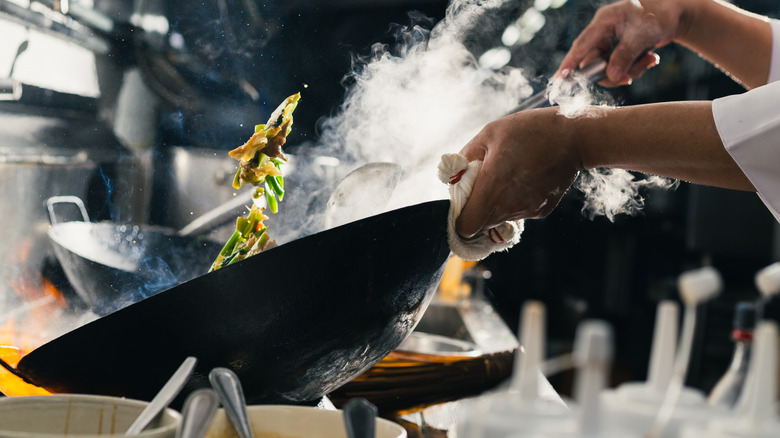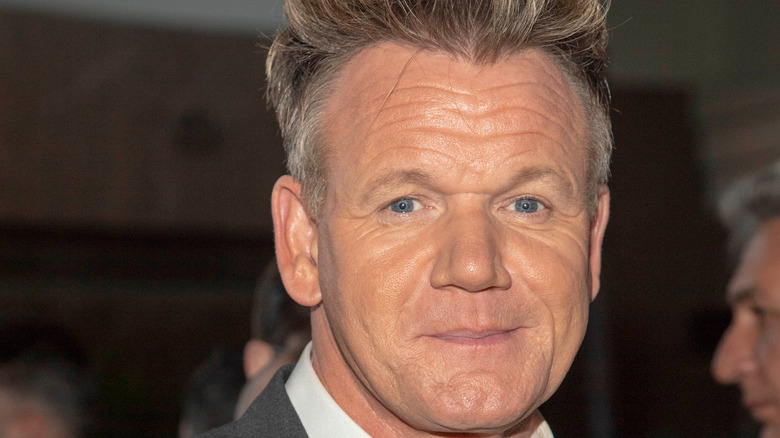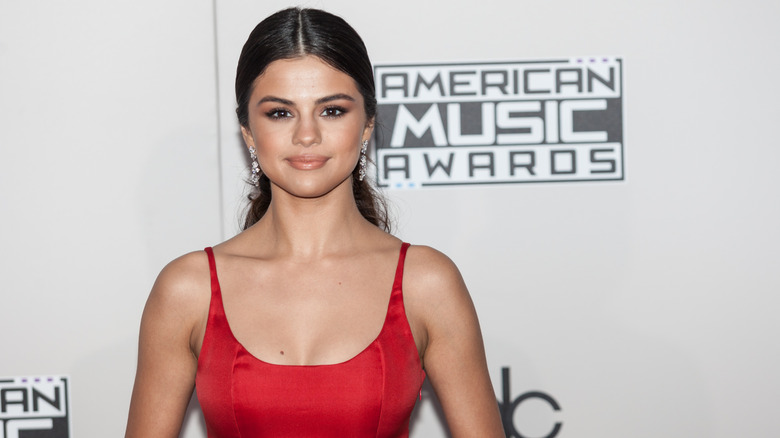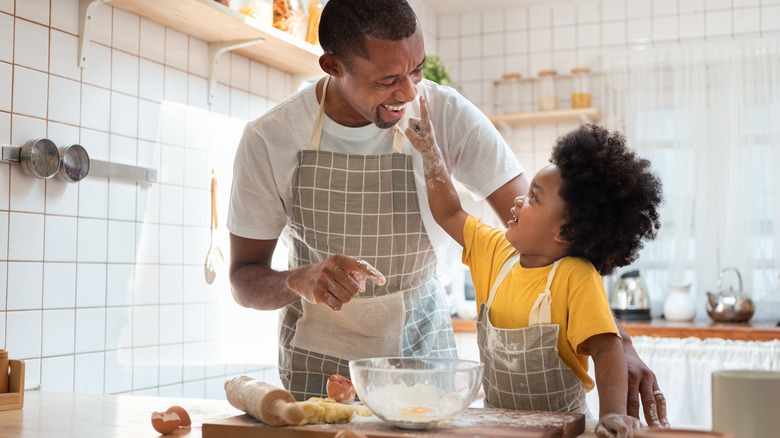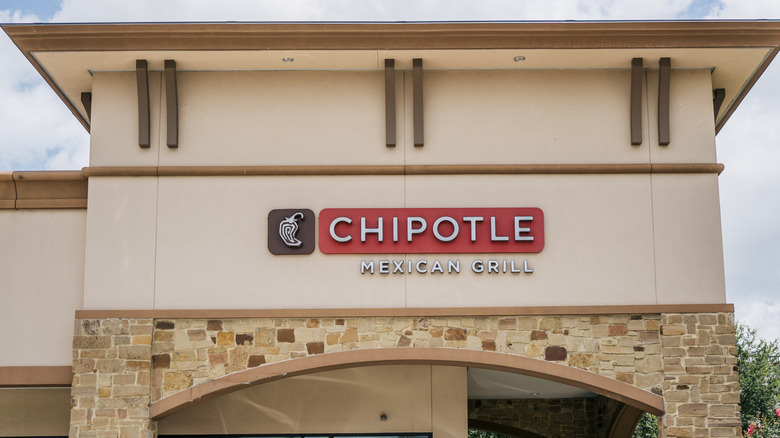Richard Blais Talks Gordon Ramsay, The Next Level Chef Set, And Chipotle - Exclusive Interview
Today, you may know chef Richard Blais from shows like "Top Chef," "Iron Chef America," "Top Chef-All Stars," or "Chopped." If you are unfamiliar with the work of this accomplished gentleman, you can probably guess at his profession based on the common word in most of those show names: chef.
While Blais has spent a lot of time on TV, he is first and foremost a legitimate professional chef, having trained at the Culinary Institute of America, cooked at such famed restaurants as The French Laundry and Chez Panisse, having written several acclaimed cookbooks, and owning and operating his own culinary consulting company, Trail Blais (Which is a clever name. Well played, Richard).
If you have not yet become familiar with Blais, then perhaps another show will change all that. "Next Level Chef," for which Blais is on of the hosts/judges, along with chef Nyesha Arrington and this other person you have probably heard of named Gordon Ramsay. Who is also a chef, FYI. And kind of a big deal.
During an exclusive interview with Mashed, Blais dished on working with Arrington and Ramsay, his awe at the "Next Level Chef" set, his love for various fast food eats, and how he has been cooking in some capacity since his youth.
Richard Blais' early days of cooking
Did you start cooking from a young age or come to food as you grew up?
I did start cooking at a young age. My first professional job was at a tiny little restaurant that I don't know if many people have heard of, but in my day, they did burgers and shakes. It was McDonald's. McDonald's was my first professional job. So at 14 years old, I was the poissonier at McDonald's, which is a very prestigious position at a hamburger restaurant. Poissonier means "fish cook" in French, so a very important position. The first batch of filet of fish sandwiches that I served when I was 14, I forgot to put the top buns on them. So I was being avant-garde well before I knew that was my actual calling in the kitchen, but it was pretty chaotic. I think [it was] a good introduction to the restaurant business.
Beyond Ronald McDonald, who were your earliest culinary influences?
When I was in the moment, I didn't really appreciate it, but both of my grandmothers. I think a lot of cooks always have that family story, and there's always someone in their family that just cooks delicious, soulful food. When I was young, I didn't appreciate it as much, but both of my grandmothers, one was very French, and really almost Julia Child-esque, and for the holidays would make her own Jell-O, but it wasn't clear so I didn't like it as a kid. It was all these sort of things that I didn't appreciate at the time — making her own stocks and sauces and gravies. My other grandmother, who was English-Irish, would just make fork-mashed potatoes with butter and salt.
I had a lot of that growing up, but I didn't quite realize it. I came of age, in the moment, where convenience food really took off and fast food was a big thing. Looking back, those were really, really big influences, but at the same time, my mom, who was not a great cook, was cooking from cans in the microwave and the freezer. I bring a lot of that into my food as well, sometimes with the technology, or even just presentation, where I'm always trying to honor the fact that a lot of chefs may have grown up on their parents' farm, or whatever their story is, but not me. I grew up with canned food, and microwave food, and stuff from the freezer as well.
The cuisines Richard Blais loves
What are some of your other favorite cuisines beyond the Americana?
I get obsessed. I think one of the great things about being a chef is that you get to be an eternal student, so it really depends where I'm at. I'm actually joining you today from Florida, where I'm opening up a new restaurant here in Orlando called Four Flamingos. We're really embracing vintage Florida cuisine, the product of Florida, but also, of course, because it's such a part of the community here, the Caribbean. Central and South America.
I'm on a pretty massive kick right now of learning about those foods and those flavors, whether it's Caribbean Curry or MOHO, or, we have a Brazilian seafood dish on the menu right now. It changes all the time, and I think that's the beauty of being a chef. That being said, my technique naturally always leans back towards the classic European training I had in French kitchens.
Learning to cook on camera
What were some of your first TV cooking experiences like?
When the cameras were on me, my first experience ever, which I remember now, because I just did a local news segment here in Florida, and I was trying to think back: "What was it like the first time you were in front of a camera?" And ... it was dreadful, because I was so serious about explaining the 100 leaves and dots that are on this plate. I just remember being so, so serious about just the food, and not really making a connection with the camera, or probably even my host at the time. That's the first time I remember being on camera as a chef in a restaurant. Eventually, the intensity and the detail got me to be on some competition shows. "Iron Chef," "Top Chef," of course. I started realizing I just loved being [there]. When you cook for someone, you just want to make someone happy and they're right in front of you. And to be able to do that times a million on a TV screen just increased that joy so much.
I really fell in love with cooking in front of a camera as well, knowing that you could just make all of these connections. It took a little while for me to realize what that was, the joy that it brought me, and then the joy, hopefully, that it brings people when they're watching me. Competition is crazy, and then you have to learn the craft of being in front of a camera as well, where you do have to connect with people, and you do have to read copy sometimes. You do have to — you smile, as an example, which was something, for three years as a competitive chef, was something that I didn't do, because quite honestly, you don't necessarily have to be smiling when you're in the back of the kitchen cooking for a hundred guests. So hopefully I'm making sense.
Appearing on Next Level Chef
What were your first thoughts on hearing the plan, the design, the layout for "Next Level Chef," and was it a project you immediately wanted to join?
The first thought was just seeing the treatment for it and just looking at a rendering of it, was that it's not something that's ever been done before. I think you hear that a lot, and you see it on paper sometimes, and you're like, "OK, it's a cooking competition that's never been done before." Then you show up in front of this thing, this set, which was the tallest non-permanent structure in Las Vegas, and is three full stories. For me, it was [almost] theatrical to be in front of it, because it's such an effort. My first thought was, "This show, without having seen anything else besides just the set, is award worthy just for the set itself."
I love the game of competition. When you see the set, and you're like, "Oh, the three levels are totally different," not just because yes, they have different equipment and you get into the culinary game that the basement only has one burner and a wobbly pan, but then small things that I'm just learning because I am in front of the camera more often, is just the lighting. The lighting on each level is totally different to set the mood, and [they did] just a fantastic job. So many great people around it. That was my first thought.
Yes, automatically I wanted to do it. I've worked with Gordon before, and I've worked with Nyesha before, and I have so much respect for both of them. I would do some guest things with Gordon, but now having worked with him for 40 days in a row, every day, the guy's intensity is just so incredible. Just to be around someone who's that great, and to be able to learn from them, someone who's excelled at their craft and every which way was pretty special, so it was an automatic yes, for me.
The competitors on Next Level Chef
What were some of the chefs competing on the show did that most impressed you?
Consistently, what impresses me is that it is very much — OK, you asked about the difference between cooking in a restaurant and cooking on camera? The answer is improv. The answer is 100% that. When you're cooking in a restaurant, you can plan, you can script, you can get set up. When you're cooking in competition, it's all improv. "Next Level Chef" happens to be, probably, the toughest improv. I've been around a lot of other cooking competition shows from every perspective. It's really fast. The chefs have to think on their feet, they have to run to this platform and grab as many ingredients as they can to work into dish, and there's always a clock in a competition show, but I feel like it's more intense and harder. Their creativity and their ability to improvise was incredible.
Were there common mistakes, especially navigating the different levels, that you saw the chefs making?
I think the common mistake was ... not grabbing enough things. That's tough to have the confidence to grab extra ingredients, because you only have one shot to grab them. I think that's something early on, certainly, I think you're going to see might happen. I think there's always trying to do too much, [which] I've learned myself from failing many times in competition, and in life, [you need to] just cook delicious [food]. At the end of the day you want to cook delicious food, you want it to be beautiful, yes, you want it to have a sense of authorship, yes. There is that first step, which is, hey, it's got to be delicious food. Just cook some delicious food. So sometimes I think chefs try to do too much. Myself included when I compete.
Were the chefs on the show more competitive, more collaborative, or was it a mix of the two?
I think it's a definite mix of competitive versus collaborative, especially with the way it's set up with the mentors, and there's this team angle of it. Different chefs get grouped into different floors. It's still an individual competition, but I think it was a really, really great balance of competitive versus collaborative, but there is a lot of strategy involved in the game. Without spoiling it, and I don't know how much you've seen, there's a little bit more strategy involved with how the chefs want to approach the competition part.
Working with Gordon Ramsay and Nyesha Arrington
What is it like working side by side with Gordon Ramsey?
It was the best master class that I could have had for 40 days. Again, I've been around him. I've always admired him. I think when you have someone that's, all of these great celebrity chefs, but Gordon, especially, the guy's running so many restaurants. He's a real chef that runs real restaurants, that cooks all of the time, and he's figured out a way that translates to him being a producer, a creator, running his own production company, all of those things. He's as intense in the kitchen as he is doing a reading before we go out on set. To me, that blew me away. That he just doesn't show up and [say,] "Turn the camera on, let me do what I do and then I'm going to leave." He's involved in every step. So for me, as someone who can only hope to get halfway up the ladder that Gordon's climbed, it was a pretty amazing lesson.
Did you find the dynamic between you, Gordon, and Nyesha came together organically and easily at the start? And were things the same behind the scenes as they were on camera?
Yeah, I think the chemistry was great from the beginning. I can't wait to see — I haven't seen any cuts of the show — so when you're competing against Gordon in this sort of friendly way, that's pretty intense in and of itself. And then Nyesha, she blew me away. She is so laser focused, and committed, and at the same time she has this incredible ability. When I'm around Nyesha, she makes everything better. She's got an aura around her that's just spectacular. She can be intense one second, and then the most loving, caring, nurturing chef within the next half second. I've known Nyesha for a while as well, so I thought the chemistry was great. And yeah, cracking jokes behind set, and having a good time, and just sort of, for me, pinching myself, realizing that we were in this moment.
Remote collaborations with Selena Gomez
What was it like cooking with Selena Gomez, and did her culinary prowess surprise you?
Yes! Here's what I will say: We still were filming sort of in this virtual world where I wasn't next to her, we were thousands of miles away. I think they play that she, or at least early on in the seasons, that she doesn't really know what she's doing. I think she's learned a lot. I don't think there were any moments with her, or her family or friends, where I was like, "Oh, someone send a medic over there. Be careful." I felt like her culinary prowess is pretty incredible. Maybe it's because it's Season 3. It was fascinating.
And my kids, they could care less what I do, but the fact that I was doing something with Selena made me a cool dad for a little bit. And the aftermath of being on that show is pretty crazy. I gained thousands of Instagram followers the day it was launched, and people were telling me that they wanted to send demos to me if I could give them to Selena, which I thought was crazy. I never met her in person yet, but yeah, a lot of fun. She's awesome.
What was the most fun part of working with her, and what were the biggest challenges?
To me, the most fun was, I think Richard Blais and liquid nitrogen as a technique have become a common thing. The fact that everyone let me send a tank of liquid nitrogen to Selena's home, and the fact that she was game to make ice cream with it, I thought was a lot of fun just because it is fun. The fact that we didn't produce something that was just like, "OK, let's make it so easy. Let's just have fun, do what you do, and let Selena learn as well." So the science part of it was fascinating.
The challenge [with remote] is always reading someone's body language, being so close to them that you know when they're about to say something. Just being detached, I think not just for the Selena show, but for all of us that have done everything virtually, it is a different cadence, and making sure that you're not stepping on people, and just getting those cues when, hey, someone's about to talk, [is] always a little harder when you're doing it virtually.
The chef's tips for casual cooks
What are a few of your tips for home chefs who want to improve their cooking?
One is to not be so worked up over recipes. Follow a recipe, but use your senses. If something seems right, don't worry about if it has to be nine minutes at 350 degrees. Use your senses, have fun, go off script when it comes to recipes. Use vinegar and citrus. Acidity is such a big part, especially in these shows when someone wins. A lot of times, it's a squeeze of lemon that can do it. I think acidity is the unsung hero in the kitchen. Salt aggressively. The average home cook doesn't season their food enough. Make sure those pans are hot. We all go through this. You need a hot pan, it needs to be smoking before you cook a piece of protein. Turn off the smoke detector. No one wants to see you topless waving down the smoke detector after you set that off. Hot pans, acidity, salt. I think those are three easy tips.
Do you have a single favorite dish to prepare, and do you have a single ingredient you can't live without?
I love, I'll give you a genre, not a dish, but simple pasta dishes at home. We love carbs in my house. It's easy to prepare. You can pop the fridge, as long as you have some pasta, and make a pretty authentic pasta dish with whatever you have on hand ... For ingredients, I'll probably go back and say it's salt or vinegar. You need the thing to put the salt and vinegar on, and if that was the case, I would say produce. I love California's produce — give me some beautiful carrots and salt and vinegar, and we're going to eat good food.
Richard Blais chooses his favorite chefs and fast food
What chef, living or dead, famous or not, would you most like to have prepare dinner for you?
I'm going to go back to culinary school and I'm going to say Auguste Escoffier, who was known as the first celebrity chef, maybe ever. I'm actually really surprised that no one's doing a scripted series about the life of Escoffier. He codified recipes for the first time, and ran the most luxurious hotels in London and Paris. I'm on a vintage kick, obviously, so I would say Auguste Escoffier.
Do you have a favorite guilty pleasure fast food?
I have two, actually. My one answer always is Chipotle. I'm a big fan of Chipotle from every which way, from their business model to food. They're just a sound company, and we eat a lot of Chipotle in my house. And I'm in Florida currently, so Pollo Tropical. I'll give them a shout out. I don't know if you've ever had Pollo Tropical, [but] it's Caribbean inspired grilled chicken, and plantains, and beans and rice, and I could eat it every single day. It's fast food, but one of my favorite concepts.
Check out Next Level Chef on FOX and keep tabs on Richard Blais at his site or on Instagram.
